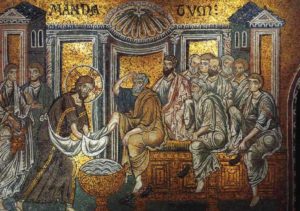3 November OS 2016 – Wednesday of the Seventh Week of St. Luke; Holy Martyr Acepsimas and Companions; Translation of the Relics of the Great Martyr George
In today’s Gospel, the Lord rebukes the egotism of the religious hypocrite:
But woe unto you, Pharisees! for ye tithe mint and rue and all manner of herbs, and pass over judgment and the love of God: these ought ye to have done, and not to leave the other undone. Woe unto you, Pharisees! for ye love the uppermost seats in the synagogues, and greetings in the markets. Woe unto you, scribes and Pharisees, hypocrites! for ye are as graves which appear not, and the men that walk over them are not aware of them. Then answered one of the lawyers, and said unto him, Master, thus saying thou reproachest us also. And he said, Woe unto you also, ye lawyers! for ye lade men with burdens grievous to be borne, and ye yourselves touch not the burdens with one of your fingers. – St. Luke 11:42-46
St. Theophan the Recluse points to the real problem with Pharisaism: the absence of righteousness and of love.
The Lord begins to reproach His contemporaries by saying that they “pass over judgment and the love of God.” The drying up of righteousness and love is the root of all disharmony, both in society and in every person. It comes from the pre-dominance of self-love or egoism køb af viagra til kvinder. – Thoughts for Each Day of the Year, p. 244
Judgment – justice – and love are now pitted against each other in the popular mind, due to generations of “progressive” propaganda. But the two are not opposed, but rather are inextricably bound up with one another. There is no love without justice, but only the tolerance of evil masquerading as love, and there is no justice without love, but only the cold calculus of enlightened self-interest. When one of these two virtues is present, the other is always there. When one is absent, so is the other.
The causes of the absence of both justice and love are the same: sin, sinful passions, and egotism. St. Theophan, later in the passage quoted above, points out that someone may seem outwardly religious and outwardly law-abiding, and so forth – but inwardly be full of rottenness, like the whited sepulchers the Lord talks about in another place. It’s not enough to be a “law-abiding, churchgoing citizen” (though it is certainly a good start!). One must struggle against the passions, live in repentance, and acquire holiness. One must love God and neighbor.
But the end of all things is at hand: be ye therefore sober, and watch unto prayer. And above all things have fervent charity among yourselves: for charity shall cover the multitude of sins. – I Peter 4:8

